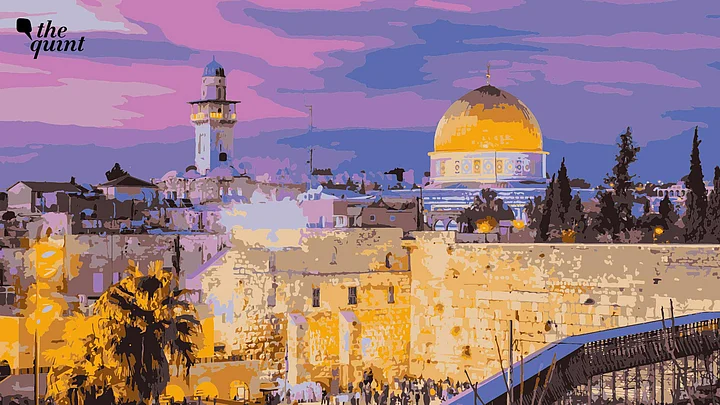Last week, during a particular escalation of violence between the Israelis and the Palestinians over the Temple Mount/Al Aqsa Mosque, holy to both Jews and Muslims, China’s special envoy for the Middle East, Zhai Jun, met with Arab ambassadors in Beijing.
Following that meeting, Chinese Foreign Ministry spokesperson Mao Ning said that China called for maximum restraint from all sides, “ particularly Israel.” “….Zhai Jun said that the pressing task now is to keep the situation under control…..China urges relevant parties, Israel in particular, to stay calm…,” the spokesperson said, adding that China supported the formation of an independent Palestinian state to create peace in the region.
China also asked the United Nations Security Council to hold emergency consultations on the Israel-Palestine situation at the request of Arab states in an effort to facilitate de-escalation.
Implicit was the message that China was stepping up its role in the region.
The Iran-Saudi Truce & the Israeli-Chinese Partnership
Given the success of the truce it recently brokered between the Kingdom of Saudi Arabia and the Islamic Republic of Iran, China now seeks to cement its role as the new peace mediator in the region. After all, the truce had been hailed positively by all countries in the region except one – Israel. This puts the spotlight back on the Israeli-Chinese partnership which had grown by leaps and bounds since at least 2013, something that the US felt the need to put brakes on from time to time.
While there is nothing in the deal against Israel, what it has done is undermine the growing Arab dependence on it to counter the Iran threat. A consensus had been building amongst the Arab states, especially amongst some of the Gulf states, that normalising relations with Israel would bring in rich dividends in terms of military, defence, technology, and trade. This found culmination in the Abraham Accords, in which first the United Arab Emirates, and then subsequently the Kingdom of Bahrain, and Morocco, normalised relations with Israel.
Saudi Arabia, given its significance in the Muslim world as home to Islam’s two holiest shrines, was more circumspect. Even then, it was a matter of when, and not if, it would follow suit. All of this may no longer matter if the Saudis normalise ties with Iran and neutralise that threat.
On one hand, it would end the regional isolation of Iran, Israel’s arch enemy, and aid its trade and economy, with no guarantees on the former's ongoing nuclear program. Some analysts believe that China has no leverage over Iran’s nuclear program. Therefore, the success of the peace agreements between the Saudis and Iranians is not a given, considering the century-old enmity between them.
On the other hand, some Arab analysts believe that one of the factors guaranteeing the deal is the non-democratic, one-party, one-leader polity of China, preempting the scenario of a new administration scuttling the deal in a year or so from now. Much will also depend on Iran’s support for Islamist groups, and its willingness to desist from such support in the future.
Towards a Multipolar Middle East?
This then would seek to also undermine the Abraham Accords, brokered by Jared Kushner, the son-in-law and advisor of former US President Donald Trump. As a corollary, it may also pave the way to further enhance and strengthen the I2U2 – India, Israel, USA, and UAE – quadrilateral.
Initiated in 2021 during the visit of External Affairs Minister Subrahmanyam Jaishankar to Israel, the Middle Eastern Quad, as it is also called, focuses on economic development and food security. The I2U2, in turn, became a possibility with the initiation of the Abraham Accords, paving the way for Indian, Israeli, and Emirati trilateral cooperation. It also seeks to balance China’s expanding footprint in the region amidst a gradual US withdrawal from there.
Strides have already been made in enhancing food security in the region, by establishing a food corridor between India and the UAE, crucial in the wake of the disruption of supply chains, first because of the coronavirus, and later because of the Ukraine war.
In a virtual summit last year between Indian Prime Minister Narendra Modi, US President Joe Biden, Israeli Prime Minister Yair Lapid, and UAE’s Sheikh Mohammed bin Zayed al Nahyan, the UAE pledged USD 2 billion for food parks to be set up in India, leveraging India’s food production capacity, with the help of Israeli and US agritech, clean tech, renewable energies, and knowhow.
In a meeting of senior officials of the group in Abu Dhabi last month, US Undersecretary of State for Economic Growth, Energy and the Environment Jose Fernandez described I2U2 as “providing a new regional platform to deepen economic integration, and an affirmative agenda within the Middle East, Asia and beyond”, serving as “a model for promoting trusted regional partnerships that can create collaborative commercial opportunities and good paying jobs.”
In due course, the I2U2 was expected to incentivise other regional heavyweights like Egypt and Saudi Arabia to join in. This may now not happen immediately. However, it has also paved the way for trilateral cooperation between India, Israel, and the UAE, as between India, UAE, and France.
There now is a distinct possibility for the participation of Japan, and a more enhanced Japanese role in the region. Israel and Japan share robust relations; last year the two signed a defence deal in keeping with Japan’s vision to achieve and free and open Indo-Pacific, and Japan now accounts for 15.8% of all foreign investments in the Israeli tech industry.
As with India, the Abraham Accords also paved the way for Japan, Israel, and UAE trilateral trade and business cooperation. This would also pave the way for enhanced India, Japan, Israel, and UAE cooperation, making the post-US Middle East truly multipolar.
(Aditi Bhaduri is a journalist and political analyst. She tweets @aditijan. This is an opinion piece. The views expressed above are the author’s own. The Quint neither endorses nor is responsible for them.)
